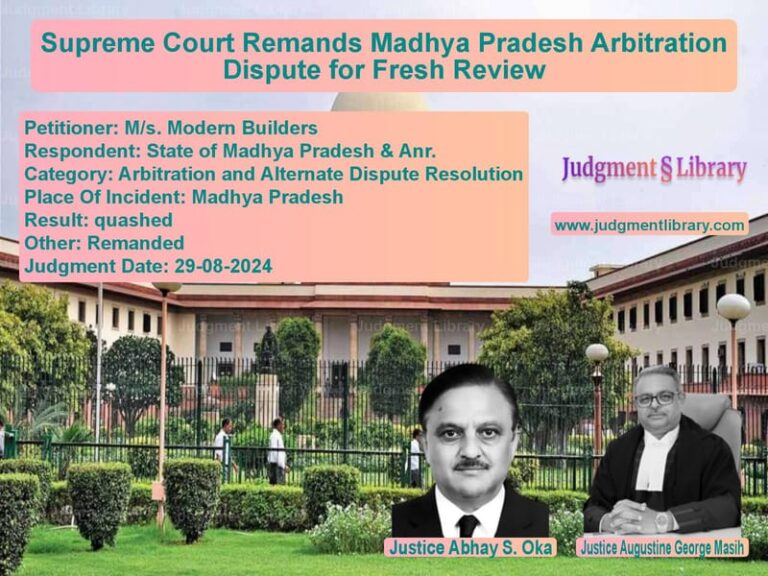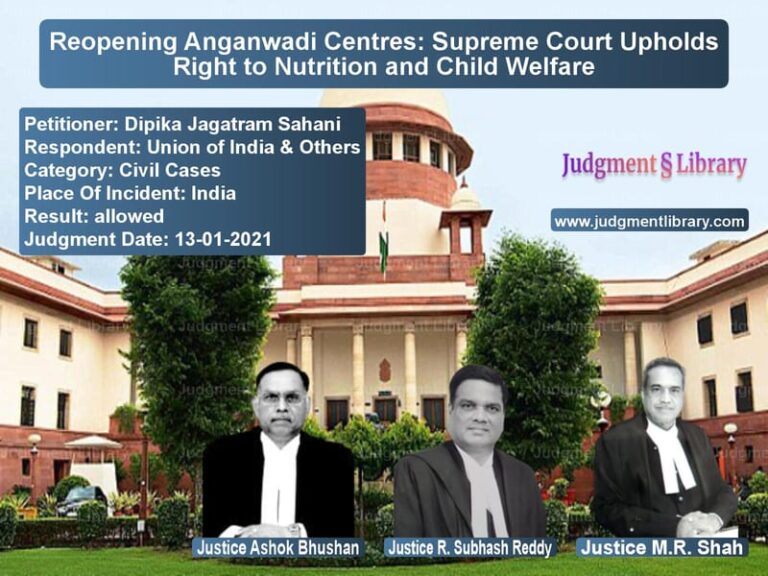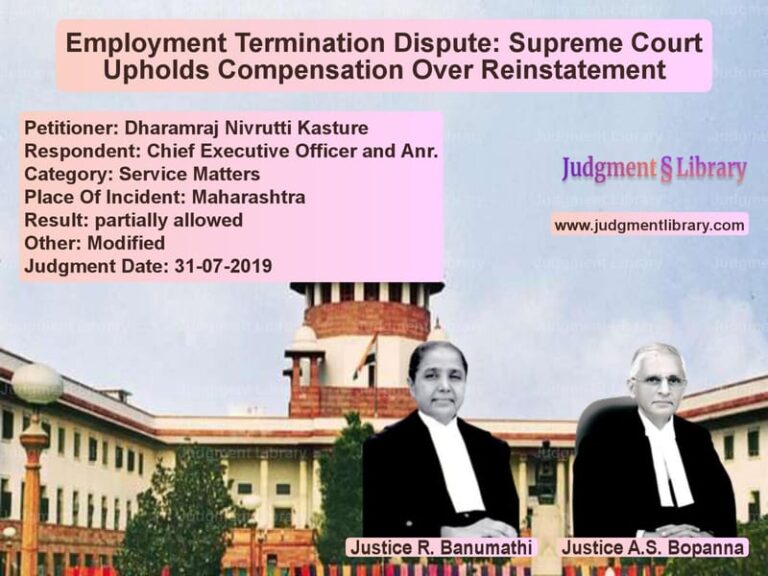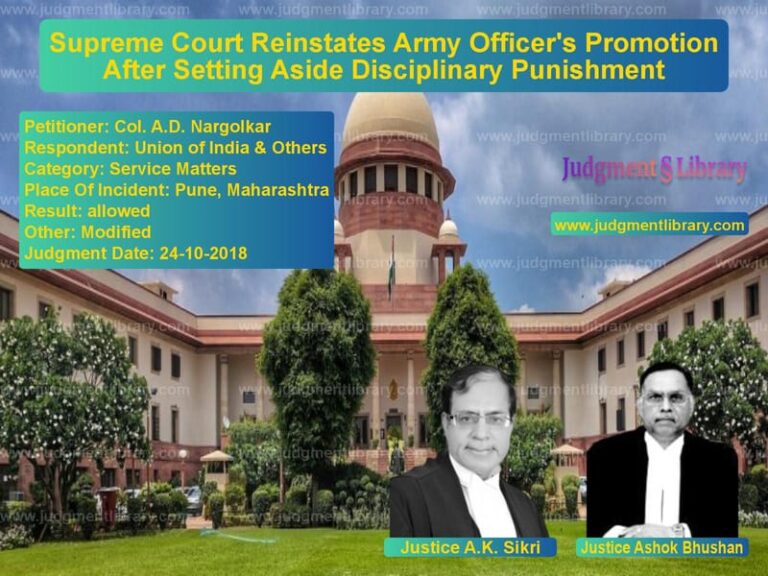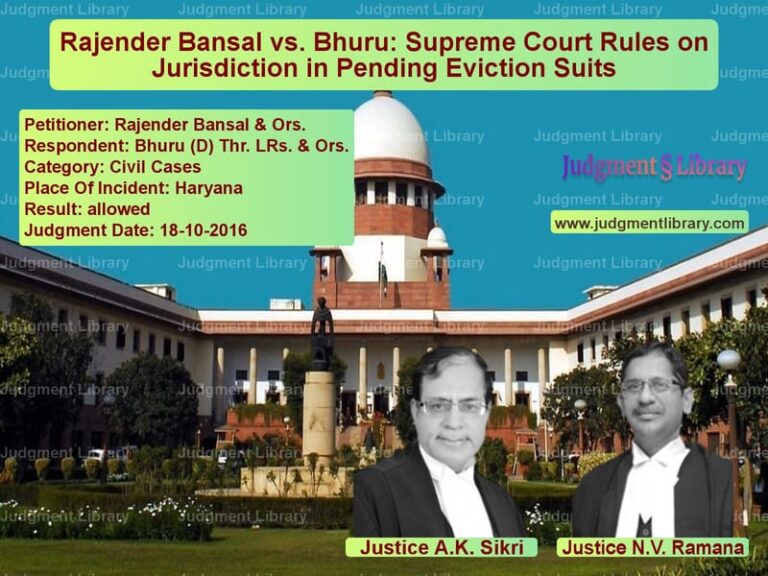Supreme Court Quashes Criminal Case Against Institute Director Over Workplace Dispute
In a recent ruling, the Supreme Court of India quashed the criminal proceedings against B.V. Ram Kumar, the officiating director of an educational institute, who was accused of criminal intimidation and negligence in providing COVID-19 protective measures. The Court held that the allegations lacked the essential ingredients of the offenses under Sections 269, 270, and 504 of the Indian Penal Code (IPC) and that the criminal case was an abuse of legal process.
Background of the Case
The case arose when the complainant, an assistant professor at the National Institute for Empowerment of Persons with Intellectual Disabilities (NIEPID) in Secunderabad, filed an FIR against the appellant, alleging harassment at the workplace. The complainant stated that on February 2, 2022, she was summoned to the director’s office, where he reprimanded her loudly for filing complaints against him. She further alleged that she was recovering from COVID-19 and that the altercation caused her severe distress.
Following this complaint, an FIR was registered against the appellant for offenses under Sections 269 (negligent act likely to spread infection), 270 (malignant act likely to spread infection), and 504 (intentional insult with intent to provoke breach of peace). The trial court took cognizance of the charges based on the police chargesheet, prompting the appellant to file a quashing petition before the High Court, which was dismissed. He then approached the Supreme Court through a special leave petition.
Legal Issues
- Whether the allegations in the FIR and chargesheet constituted a prima facie offense under Sections 269, 270, and 504 of the IPC.
- Whether workplace disputes should be criminalized in the absence of clear criminal intent.
- The scope of judicial intervention in quashing criminal proceedings under Section 482 of the Code of Criminal Procedure (CrPC).
Arguments by the Appellant
The appellant’s counsel argued that the criminal case was malicious and aimed at settling workplace disputes through criminal litigation. The primary contentions were:
- The complaints were motivated by personal animosity and had already been addressed administratively by higher authorities.
- The allegations did not disclose any act that could be considered negligent under Sections 269 and 270 IPC.
- The alleged verbal exchange, even if true, did not constitute “intentional insult” under Section 504 IPC.
- The complainant failed to establish any real risk of infection spread due to the appellant’s actions.
“The appellant was merely questioning the complainant’s performance in his capacity as a director. This cannot be construed as a criminal act.”
Arguments by the Respondents
The complainant and the State of Telangana opposed the appeal, arguing:
- The appellant’s behavior was part of a pattern of workplace harassment, affecting the complainant’s mental well-being.
- Failure to provide adequate PPE kits at the institute during the pandemic posed a risk to employees.
- Multiple witnesses corroborated the complainant’s version of events.
“The appellant’s consistent harassment and failure to ensure adequate COVID-19 safety measures endangered employees and warranted criminal prosecution.”
Supreme Court’s Observations
The Supreme Court scrutinized the allegations and the evidence presented in the chargesheet. The key observations were:
- The allegations, even if accepted as true, did not satisfy the essential ingredients of the offenses under Sections 269 and 270 IPC.
- No material evidence suggested that the appellant’s actions directly contributed to the spread of infection.
- Workplace disagreements should not be escalated to criminal prosecution unless there is a clear intent to cause harm.
- The charges under Section 504 IPC were unfounded as there was no intentional insult meant to provoke a breach of peace.
“Workplace discipline and administrative actions should not be confused with criminal intimidation. The present case is a clear misuse of criminal law for personal grievances.”
Final Judgment
The Supreme Court ruled:
“The impugned judgment of the High Court is quashed, and the criminal proceedings in Case Crime No. 1771 of 2022 against the appellant are hereby set aside.”
The Court also emphasized that courts must guard against the criminalization of administrative and professional disputes, which could create a chilling effect on workplace management.
Significance of the Judgment
This ruling reinforces the principle that criminal law should not be misused to settle workplace disputes. It provides clarity on:
- The limited scope of Sections 269 and 270 IPC concerning allegations of negligence during public health crises.
- The threshold required to establish “intentional insult” under Section 504 IPC.
- The necessity of maintaining a balance between workplace discipline and wrongful criminal prosecution.
By quashing the case, the Supreme Court reaffirmed that judicial intervention is necessary to prevent abuse of the legal process and to ensure that criminal law is not weaponized for personal vendettas.
Petitioner Name: B.V. Ram Kumar.Respondent Name: State of Telangana and Another.Judgment By: Justice Sanjay Karol, Justice Sandeep Mehta.Place Of Incident: Secunderabad, Telangana.Judgment Date: 10-02-2025.
Don’t miss out on the full details! Download the complete judgment in PDF format below and gain valuable insights instantly!
Download Judgment: b.v.-ram-kumar-vs-state-of-telangana-a-supreme-court-of-india-judgment-dated-10-02-2025.pdf
Directly Download Judgment: Directly download this Judgment
See all petitions in Bail and Anticipatory Bail
See all petitions in Contempt Of Court cases
See all petitions in Judgment by Sanjay Karol
See all petitions in Judgment by Sandeep Mehta
See all petitions in allowed
See all petitions in Quashed
See all petitions in supreme court of India judgments February 2025
See all petitions in 2025 judgments
See all posts in Criminal Cases Category
See all allowed petitions in Criminal Cases Category
See all Dismissed petitions in Criminal Cases Category
See all partially allowed petitions in Criminal Cases Category


